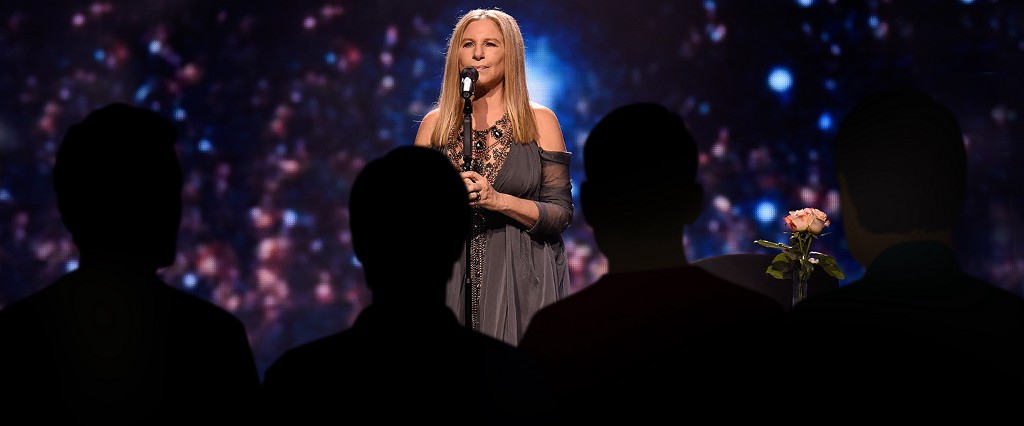When you think of the name “Barbra Streisand,” what is the first thing that comes to mind — besides a singing sensation with a five-decade career and over 145 million records sold? Obviously, you think “gay icon.” That’s because Barbra has been using her voice — which hits you like an iron fist wrapped in velvet — to speak up for gay rights since the beginning of her career, which, as it happens, began in a gay nightclub.
But if you think Streisand only appeals to gay men, you greatly underestimate her appeal: We found four straight male fans of Babs, who were more than happy to share their love of the best-selling female artist of all time — and their thoughts on being the odd ones out in her fan base.
As it turns out, their sexuality isn’t the only thing they have in common: The youngest interviewee is 50, and they live or have lived in New York and its surrounds.
OUR PANEL
Ron Mancini: a dentist in his mid-50s
Ryk Spoor: a 54-year-old research and development coordinator
Teel James Glenn: a novelist in his mid-50s
Eric Klein: a 50-year-old telecom security expert.
How did you come to be a fan of Barbra Streisand?
Ron Mancini: She has just a fantastic voice. I was just a kid at the time. Back in the ‘60s, she was doing different movies, the musicals and the comedies. Then she evolved from that into more serious acting and directing back in the ‘70s and ‘80s. It wasn’t just her music or movies. It’s her whole personality. She’s talented, interesting, and funny.
Ryk Spoor: Somewhere in the early to mid ‘70s, I heard this woman singing. I instantly knew, oh my god, she has this amazing voice. When she sang, she could be a belter or she could be delicate, which is something some people have trouble doing — they’ll either belt or they’ll have delicate control. She was able to cover both ends of it. Her voice, at her peak, it was one of the most stunning voices I’ve never heard. It was a couple of years [later that] I learned her name was Barbra Streisand. I can’t even remember which of her songs was the first one, because I was concentrating on the voice itself.
What is it about her that you admire?
RM: First of all, the nose. I have a large nose, and [she reminds us that] people who didn’t exactly look perfect could still be talented or funny. She’s more of an everywoman, and I think it drew many people to her. I’m from New Jersey and she has a New York comedy [style], the way she talks and responds to things. She has this kind of chutzpah. That’s also endearing.
Eric Klein: I’ve always loved her versatility. She’s always been a very creative actress and puts a lot of feeling into [her voice] when she sings. You can believe she believes what she’s singing at the time. Her performances are from the heart but a little bit over the top, full of life, full of vibrancy.
Teel James Glenn: She’s a strong female voice that never feels threatening to men. She always encourages you to do your best, because she’s being honest in doing her best. She’s a girl from Brooklyn and I’m from Brooklyn, and I get that. I think she’ll be remembered as almost a New York landmark, the way you think of the Empire State Building. She embodies the idea that you can succeed if you believe in yourself, and you don’t have to crush people to do it.
Streisand is a gay icon. Would it bother you if someone thought you were gay because you were such a fan?
EK: No. Never was an issue. Being gay and being straight or some mix in between really shouldn’t make a difference to who listens to what music.
TG: I would just kind of smile and go, “Okay, if you say so.” I know where I’m at. Do they question your sexuality if you like Marilyn Monroe because she’s a gay icon? It’s the same story here. I think it’s really silly.
Why do you think she appeals to the gay community?
TG: She’s completely comfortable with who she is and makes you comfortable with who you are because of it. There’s no neuroses. It’s, “Hi, this is me. How you doing?”
EK: I’m not positive, but I think there are reasons why transgender people might associate with her: In Yentl, it’s a girl dressing like and living like a guy that’s something that they can probably relate to. She had to pretend to be something she wasn’t in order to fit in where she needed to be.
Why do you think she would appear to a straight man?
RS: One of the reasons I was surprised [Barbra] was looked at as a gay icon is because she was clearly regarded as a straight sex symbol when I was younger. And if you at some of the pictures taken of her, you’ll see it was intentional, she was presented that way just like any other movie star, despite the fact she didn’t have the “Hollywood” look. Nonetheless, she had a force of personality, and she was considered a sex symbol. Just a rather unusual one.
What from Babs’ music would you recommend to your straight male friends?
RM: It doesn’t matter if they are gay or straight — I would recommend Barbra’s works because of her immense talent. That being said, I would recommend her album The Essential Barbra Streisand to any of my friends because it has so many hits. I haven’t seen any of her movies in a long time, but I always liked What’s Up, Doc?
RS: Yentl was a great story. Admittedly it’s a romance, but if I wanted them to understand what she was capable of, again, that’s it. That’s where she’s at the top, taking control of her career and her singing.
All of the Babs fans I’ve found to interview are 50 and older; why do you think that is?
RM: There are other bands out… who might release an album of new rock that might bring in some young people. I don’t see that with Barbra as much. She’s really talented, but there’s not a huge amount of younger people [who listen to her].
EK: Her big and popular years were late ‘70s through ‘80s. It was always on the radio; it was part of our environment at more or less the peak of her career. So you had an entire generation who grew up after she eased back. When I introduced my kids to them, they enjoyed her very much. But if I hadn’t made an effort, it’s not like you can see her on TV or the radio, except on the oldies station.
Streisand just released an album of duets, and is touring in concert. How else can she stay relevant?
RS: Does she want to? I don’t know. She’s known for being somewhat reclusive. Maybe she doesn’t need or want a huge revival. As far as I know, she’s done quite well monetarily, so she doesn’t have a need to revive herself in that sense. I believe she can charge what she wants and do what she wants at her concerts, so she may be perfectly comfortable with her current popularity.
TG: I don’t know if she wants to be relevant. I know she’s going to be directing a new film she’s not in. But I think she’s comfortable enough to do what she enjoys.
RM: Maybe she’ll sing at Hillary’s inauguration. That would be fabulous.

